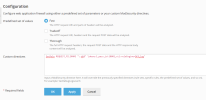- Server operating system version
- Ubuntu 24.04 LTS (GNU/Linux 6.8.0-36-generic x86_64)
- Plesk version and microupdate number
- Plesk Obsidian Versión 18.0.62, 28/June/2024 22:53
I have a dedicated Plesk server with several domains. In one of them I want to make available a file called, say, "file.db"
If I try to download that file from a web browser, I get a 403 error page saying:
If I rename the file to a more standard extension, like "mp3" (even though it's not really an mp3 file), then I can download the file from the browser.
So there must be some restriction to let browsers only download files with some extensions.
I tried to edit the files "mime.types" and "mime.types.default" inside /etc/nginx to add a line with "application/octet-stream db;" and then restarting the service/server but that accomplished nothing. I still get the 403 page when trying to download the file.
So how can I make the server allow downloading files with ".db" extension? (renaming the file extension is not an option for me since the file name is hard coded into an app that downloads that file).
Thanks!
If I try to download that file from a web browser, I get a 403 error page saying:
Forbidden
You do not have permission to access this document.
Web Server at @domain_name@
If I rename the file to a more standard extension, like "mp3" (even though it's not really an mp3 file), then I can download the file from the browser.
So there must be some restriction to let browsers only download files with some extensions.
I tried to edit the files "mime.types" and "mime.types.default" inside /etc/nginx to add a line with "application/octet-stream db;" and then restarting the service/server but that accomplished nothing. I still get the 403 page when trying to download the file.
So how can I make the server allow downloading files with ".db" extension? (renaming the file extension is not an option for me since the file name is hard coded into an app that downloads that file).
Thanks!

